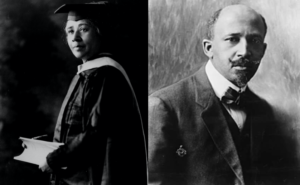Lecture Date: February 23, 2021
The Hirschler Lecture

William Edward Burghardt Du Bois (1868-1963) and Anna Julia Haywood Cooper (1858-1964) are both famous for their critical intellectual engagement with politics, civil rights, and education. Sociologists during the early establishment of the discipline in the U.S., their foundational contributions to critical race theory and black feminist thought were well-known at the time. But their contributions were actively marginalized, and it hasn’t been until recently that scholars have begun to establish their central importance to our understanding of the relationship of African Americans with the history and legacy of slavery and with a white-dominated society persistently in denial of structural racism and the daily injuries of interpersonal racism.
Anna Julia Cooper’s A Voice From the South is one of the earliest expressions of black feminism. And W. E. B. Du Bois’ life-long examination of race in the U.S., as well as his work to establish the Sociology Department at Atlanta University, are now recognized as core to classical sociology and social thought.
This talk will present central intellectual contributions of both scholars and, relying on contemporary scholarly work on the history of sociology, will interrogate the process whereby marginalized scholars are recognized as important in their own time, are written out of our disciplinary origin stories early on, and must be rediscovered and reestablished as intellectual giants in their own right.
For further reading on Anna Julia Cooper and W. E. B. Du Bois, see an op-ed by Kristin Marsh, published in the Free Lance-Star.
Speaker: Kristin Marsh

Kristin Marsh, Ph.D., is Professor of Sociology and Chair of the Department of Sociology and Anthropology at the University of Mary Washington, where she has taught for over 20 years. Kristin teaches courses in sociology and women’s and gender studies, including Social Stratification, Aging and Society, Gender and Work, History of Social Theory, and Feminist Theory and Intersectionality. Central concerns include a focus on the ways that race, class, gender, and other categories of difference and inequality are structured and reproduced through social institutions.